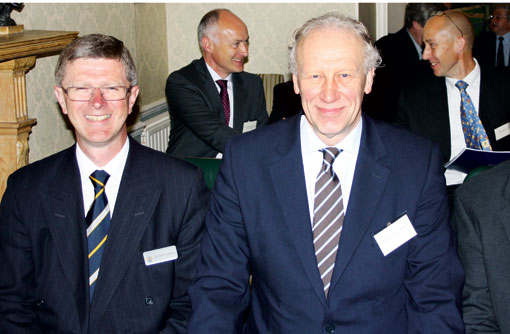Turkey has chance to be the world’s meat

Turkeymeat has the chance to become a regular feature on the world’s dinner plates, with many emerging and established markets still growing production and constraints on resources making it an attractive alternative to other protein sources.
Presenting this year’s Temperton Fellowship research report at the Farmers Club in London, Richard Hutchinson, Templeton Fellow and sales and marketing director at Aviagen Turkeys, outlined his view of the future of turkey production.
In the report, Mr Hutchinson says 86% of the world’s population consumes little or no turkey, creating rich ground for the expansion of production, while almost all major global production was centred in North America (51%), the European Union (34%) and Brazil (8%), the last of which has expanded dramatically since 2000.
Brazil is now the second-largest producer of turkey in the world, behind the USA, with production climbing from just over 100,000t in 1999 to almost 450,000t in 2010, supplying export markets mainly in Mexico and the EU. Domestic consumption in Brazil is also expanding healthily, moving from 0.5kg/head/year to 1.4kg/head/year in the decade up to 2010.
Production of turkey in the USA has been stable, producing a total of 2 billion tonnes annually, including 40 million birds for Thanksgiving and 25 million for the Christmas market. Despite feed prices being high, birds are still selling well, fast food outlets are becoming more interested in selling turkey and red turkeymeat is gaining in popularity.
Though European turkey production grew over the last 30 years, with nations such a Germany, Italy and France moving into larger production, growth is now hitting a plateau.
France did see growth in consumption of 1.6% in 2010 for fresh turkeymeat, 5.1% for processed meat and 17.8% for smoked products, while demand in Germany has grown slightly. But Italian consumption declined by 2.1%.
Markets such as Poland, North Africa, Spain and Russia have seen good growth in production to supply domestic demand, but producers are also increasingly targeting export markets.
In Poland, consumption has expanded from less than 1,000t of turkeymeat in 1988, while still under communism, to over 5 million tonnes in 2011, with room to grow further for both domestic and export markets. Currently domestic demand is strong, with turkeymeat featuring widely in supermarkets and in restaurants.
Tunisia and Morocco, the report said, have seen rapid growth in the consumption of white meat, and the development of domestic breeding programmes has expanded the number of farms and the amount of production. In Morocco 15.4kg/head/year of poultrymeat is consumed on average, with turkey making up 25% of poultry eaten by Tunisians.
Russia is expected to continue growing its production as it seeks to reduce imports of meat and to satisfy local demand. Turkeymeat’s versatility as a food was also highlighted in the report, as it is able to be adapted to the tastes and cooking styles of the diverse regions of the nation.
Disease outbreaks and scares have had a limiting effect on production in some nations, with Turkey and Tunisia both affected. Sales of turkeymeat in Turkey have yet to reach their pre-avian influenza levels, but with higher prices for sheep and beef, consumers are switching back.
In the UK, production has declined considerably to 160,000t in 2011 since production peaked in 1998 at 296,000t. The report did outline that the Christmas and Easter market, around which the industry is based, was still growing and there were efforts to promote turkey more strongly this year.
* Richard Hutchinson’s report, “The challenge of supplying high-protein turkeymeat as part of the global demand for food” is available from Harper Adams University College for £15. Contact Mary Early on 01952 815 275.
Temperton Fellowship history
The Temperton Fellowship was established to commemorate the contribution of Dr Harold Temperton, director of the National Institute of Poultry Husbandry at Harper Adams University College from 1951 to 1974.
It is financed by the accrued annual interest from the Temperton Trust investments, derived from contributions and donations, as well as proceeds from sales of the book The History of the National Institute of Poultry Husbandry by ME Telford, PH Holroyd and RG Wells.
The next Temperton research fellow, poultry veterinarian Nigel Horrox, will present his report in June 2012.
British Turkey Awards
The British Turkey Awards are open for entries until 15 July. Now in its 15th year, the event is a mix of catering, retail and consumer awards, showcasing the best of British turkey products and promoting the use of turkey on menus. It includes a category for best school meal, with school cooks asked to create their own original turkey recipe and serve it to their students. Details and entry forms are available from www.britishturkey.co.uk or phone 0800 783 9994.
